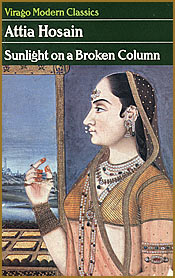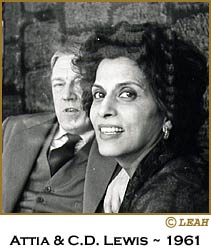10. Sunlight on a Broken Column, 1961 
I was also, as I say, by now suffering deeply from this homesickness. I did go back in 1951 to India for recorded stuff and I went back for a month or six weeks because I had begun to lose hair which falls out with nervousness and unhappiness and the specialist said this "why she is here?" She is obviously a very unhappy person here [in England]. Well, so I came back cured and full of thoughts again and I began to realise I had to write that other book that I had promised Chatto's - not that I did the second and third. But I sat down to write that one [Sunlight on a Broken Column]. I' work and then I'd go off and sit in the country where I had a friend and stayed with her and she looked after me and shoved the food near the door and I'd go on. Then there'd be a gap because I couldn't go on then. Then I'd pick it up. In the strangest places that book was written. In Rahimyar Khan [Bahawalpur district, Punjab province, Pakistan], which was then like a wild-west outpost. QUESTION: Still is. AH: Is it? With all those people, tribesmen sitting near that railway station so that I'd get off and feel why haven't I got a burqa on? But it was good for me because I would be alone and fed and I wrote some there and it didn't go on. Then I didn't know what on earth to do with myself, I said, oh enough, I can't write and that is the end of it. If I could write a short story but what is this novel? I went then to stay with my friend, the one I told you, had talked to me after partition. I went to Nepal. He was Ambassador [of India to Nepal, Bhagwan Sahai] by then and when nobody would go to Nepal at that time, in 1956, I think it was or it was not it? It had just had that coup and the King took over. It was getting more and more rough. Anyway, I sat there and one day I said to him please don't come in near me, please don't expect me to come, to have a meal and just have some food sent in to my room. I've got to do something about this book. Now that I am in this place where everything was rather beautiful, to go and visit all those places not with tourists around at all. And I wrote it. Then I came back and I thought, look this is not what I wanted really to say. And I couldn't write it. And I wrote this book [Sunlight on a Broken Column] and was dissatisfied with it. But I handed it in to the agent and she was delighted and said that the person who was editing it and looking after it was Cecil Day Lewis [later poet-laureate of England].  Well, I mean I couldn't have dreamt of such a thing happening. I, who had read his poems, and been, as I told you that girl in my school reading all these people and wanting so much later on when I grew older and went to the university to meet poets and writers, that it should be Cecil Day Lewis involved with this? Well, I mean I couldn't have dreamt of such a thing happening. I, who had read his poems, and been, as I told you that girl in my school reading all these people and wanting so much later on when I grew older and went to the university to meet poets and writers, that it should be Cecil Day Lewis involved with this?She said, he's actually said that it is very autobiographical. It was very thick, and he thinks it is autobiographical. I got very angry and I said, what does he mean by autobiographical? Every first novel or any novel will have to be part of oneself and people one knows, but it is not the people and it is not actually the events but it is at the same time yes. Then she said you better come and talk to him. Then I met him for the first time. He became a very dear friend later on. I said to him, I am afraid, I won't touch it now and he said, well, there are certain parts of it that I think you shouldn't have put in to it and I said that is how it was. And he said something to me that stuck in my head: but life is not art. You are writing a book. It is not how it was as you say in those terms and would you mind if you took some bits out? I said I won't touch it, it gives me nightmares. He said I am marking, I have marked some of the pages I was questioning. So I went off into the country and I sat with it and I can't tell you how much I sliced off. I am now sad that I threw it away because there might have been in it part of the political things that he couldn't have found at the time of any use to him, which I would find useful now as memory even. I just hacked it as I thought. The last chapters of it are almost as if I've condensed what I would have done in the next one because it is as if she has come back to her home after the partition. But the in between has gone out of the actual, as I say the pain of that partition for most of us who were left behind and sad to think that now [of] the ones who are there [in Pakistan]. They might be rich as they would never have been. They might have become Generals when they would have been only Lieutenants. But they have also felt the pain of not being accepted, totally, and sometimes it makes me angry when any of them questioned me from either side of that partition and say "oh you living in England what would you know?" In the first place, I know more than they do because I had to identify much more because I am challenged the whole time, my identity is. Also they do not know, that added to their pain of separation and uprooted feelings which they shouldn't have in Pakistan, they should have become part of it by now. What about us over here [in England]? You see that is the book that should have been written too and I am glad that there are young people writing. I am glad there are people like Aamir [Hussain] writing and if I can do nothing else I can't sit and write now because my concentration seems to have gone, though the ideas are there. I wish I could help each one of them to say, say to them you never stop, just go on because it will come. So that is the theme of it, the decay of the breaking up of a family in a way, when the whole background is changing. And what is going on and then coming back into that house [at the end of Sunlight on a Broken Column], into that place and feeling it. Q: I am sure you are asked this all the time, but why haven't you written a book since then? Was the book a real success? AH: I couldn't have asked for more. I got such good literary reviews, I can't tell you. I got asked after Phoenix Fled to be on television and everything. Why didn't I write because in my own personal life there were problems of a certain kind. I always say to people, there was so much the mind can bear and then it does not. My brother's death, my other deaths in the family, that kind of disruption got to me more, I mean I just felt, what I am trying to say to whom? People have said these things, said them better. Why am I being presumptuous that I should say any more. Q: Although it is still very different for you than it is for any one else, so you would always have your own story. AH: Exactly but why? I thought why? And when I read so and so has written an autobiography and somebody has written this and that. Compton MacKenzie once said to me why don't you Attia write your autobiography? I thought, why did they all write autobiographies, why does every body [write autobiography]? I loved him, that dear old man. He was quite an extraordinary man. Really a man who was a real human being, at 90 practically as young as anybody in his mind. I thought that if I write an autobiography, I would be telling the truth. Because I would be selective as I do not believe in exposing anybody else and one's life does expose other people. Very much so. So I didn't think in terms an autobiography but I certainly thought of fictionalizing certain aspects of the development that have happened since then. I am thinking. It needs to be written now because people are forgetting. People are forgetting all those things, they are forgetting that other world that I actually lived in, existed. There were people then who believed in the future. > Image © The Literary Estate of Attia Hosain (LEAH) |
| SOUNDS
| HOME